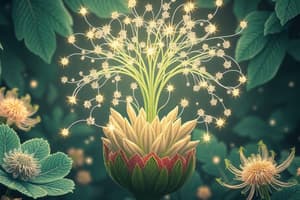Podcast
Questions and Answers
Which specific molecule in photosystem II primarily absorbs light during the light-dependent reactions?
Which specific molecule in photosystem II primarily absorbs light during the light-dependent reactions?
- Xanthophylls
- Phycobilins
- Carotenoids
- Chlorophyll (correct)
What is the initial effect of light absorption in photosystem II?
What is the initial effect of light absorption in photosystem II?
- Water splitting
- Production of ATP
- Raising electrons in chlorophyll to a higher energy level (correct)
- Formation of NADPH
After electrons in photosystem II absorb light energy, to what component are they passed?
After electrons in photosystem II absorb light energy, to what component are they passed?
- Calvin cycle
- Photosystem I
- ATP synthase
- Electron transport chain (correct)
Why is the first discovered photosystem called photosystem II?
Why is the first discovered photosystem called photosystem II?
In what figure would you find the depiction of chlorophyll molecules absorbing light in photosystem II?
In what figure would you find the depiction of chlorophyll molecules absorbing light in photosystem II?
What molecules are produced during the light-dependent reactions?
What molecules are produced during the light-dependent reactions?
Where do the light-dependent reactions of photosynthesis occur?
Where do the light-dependent reactions of photosynthesis occur?
What is the primary role of chlorophyll in the light-dependent reactions?
What is the primary role of chlorophyll in the light-dependent reactions?
What is one of the by-products of the light-dependent reactions?
What is one of the by-products of the light-dependent reactions?
What initiates the light-dependent reactions in photosynthesis?
What initiates the light-dependent reactions in photosynthesis?
In photosynthesis, what is the source of the high-energy electrons generated during the light-dependent reactions?
In photosynthesis, what is the source of the high-energy electrons generated during the light-dependent reactions?
What element is liberated as a by-product during the light-dependent reactions?
What element is liberated as a by-product during the light-dependent reactions?
Which specific location within the chloroplast does the light-dependent reaction take place?
Which specific location within the chloroplast does the light-dependent reaction take place?
What do the light-dependent reactions of photosynthesis convert ADP and NADP+ into?
What do the light-dependent reactions of photosynthesis convert ADP and NADP+ into?
What type of energy is utilized in the light-dependent reactions of photosynthesis?
What type of energy is utilized in the light-dependent reactions of photosynthesis?
Which of the following molecules are the primary energy carriers produced by the light-dependent reactions?
Which of the following molecules are the primary energy carriers produced by the light-dependent reactions?
Which molecules serve as the substrates in the conversion process during the light-dependent reactions?
Which molecules serve as the substrates in the conversion process during the light-dependent reactions?
In light-dependent reactions, which components are correctly matched with their role?
In light-dependent reactions, which components are correctly matched with their role?
What molecule is used in the Calvin cycle to produce a six-carbon sugar?
What molecule is used in the Calvin cycle to produce a six-carbon sugar?
Which process directly supplies the energy needed for the Calvin cycle?
Which process directly supplies the energy needed for the Calvin cycle?
What does the Calvin cycle use from the atmosphere to fuel the synthesis of sugars?
What does the Calvin cycle use from the atmosphere to fuel the synthesis of sugars?
In addition to sugars, which compounds are synthesized using the products of the Calvin cycle?
In addition to sugars, which compounds are synthesized using the products of the Calvin cycle?
What is one of the end results of the Calvin cycle related to energy for organisms?
What is one of the end results of the Calvin cycle related to energy for organisms?
What creates the difference in H+ concentration across the thylakoid membrane?
What creates the difference in H+ concentration across the thylakoid membrane?
What happens to the carbon dioxide used in the Calvin cycle?
What happens to the carbon dioxide used in the Calvin cycle?
In the process of ATP synthesis in chloroplasts, what role does ATP synthase play?
In the process of ATP synthesis in chloroplasts, what role does ATP synthase play?
What happens immediately after electrons are released by photosystem II?
What happens immediately after electrons are released by photosystem II?
How is NADPH generated in the thylakoid membrane?
How is NADPH generated in the thylakoid membrane?
Which component is responsible for splitting water molecules to release electrons?
Which component is responsible for splitting water molecules to release electrons?
Where does the energy to power ATP synthesis come from?
Where does the energy to power ATP synthesis come from?
What is the main purpose of the light-dependent reactions?
What is the main purpose of the light-dependent reactions?
What is represented by the yellow line in the diagram?
What is represented by the yellow line in the diagram?
What is a key difference between C4 and CAM plants in their photosynthetic adaptations?
What is a key difference between C4 and CAM plants in their photosynthetic adaptations?
Why do C4 plants require extra energy in the form of ATP?
Why do C4 plants require extra energy in the form of ATP?
What is the primary purpose of the specialized chemical pathway in C4 plants?
What is the primary purpose of the specialized chemical pathway in C4 plants?
Which of the following is not true about CAM plants?
Which of the following is not true about CAM plants?
What is the main advantage of the adaptations found in CAM plants?
What is the main advantage of the adaptations found in CAM plants?
Why do most plants close their leaf openings in bright and hot conditions?
Why do most plants close their leaf openings in bright and hot conditions?
What unique biochemical adaptation is found in all CAM plants?
What unique biochemical adaptation is found in all CAM plants?
Which of the following plants is an example of a C4 plant?
Which of the following plants is an example of a C4 plant?
Why does the rate of photosynthesis become high and similar in both plants at low light intensity?
Why does the rate of photosynthesis become high and similar in both plants at low light intensity?
What advantage does a higher rate of photosynthesis in strong light provide to the plant?
What advantage does a higher rate of photosynthesis in strong light provide to the plant?
Which temperature range is optimal for enzyme function in photosynthesis?
Which temperature range is optimal for enzyme function in photosynthesis?
What primarily limits the rate of photosynthesis when light intensity reaches a certain level?
What primarily limits the rate of photosynthesis when light intensity reaches a certain level?
Which adaptation helps plants survive in dry conditions?
Which adaptation helps plants survive in dry conditions?
How does water scarcity affect photosynthesis?
How does water scarcity affect photosynthesis?
Why might photosynthesis rates slow down at temperatures below 0°C?
Why might photosynthesis rates slow down at temperatures below 0°C?
What happens to the rate of photosynthesis as light intensity increases initially?
What happens to the rate of photosynthesis as light intensity increases initially?
Flashcards are hidden until you start studying
Study Notes
Photosynthesis
- Photosynthesis is the process by which plants take in carbon dioxide and water, and with the help of sunlight, produce sugars and oxygen.
Light-Dependent Reactions
- The light-dependent reactions occur in the thylakoids of chloroplasts and use energy from light to create ATP and NADPH.
- Oxygen (O2) is produced as a by-product of the light-dependent reactions.
- The light-dependent reactions include the steps of photosynthesis that directly involve sunlight.
Photosystem II
- The light-dependent reactions begin in photosystem II.
- Chlorophyll molecules in photosystem II absorb light, which raises electrons to a higher energy level.
- These high-energy electrons are passed from chlorophyll to the electron transport chain.
Hydrogen Ion Movement and ATP Formation
- Hydrogen ions (H+) accumulate within the thylakoid space.
- The buildup of hydrogen ions creates a difference in H+ concentration across the thylakoid membrane.
- ATP synthase harnesses the concentration difference of H+ to power ATP synthesis.
- The movement of electrons and H+ in the thylakoid membrane generates a proton gradient that drives ATP synthesis.
The Light-Independent Reactions (Calvin Cycle)
- The Calvin cycle uses six molecules of carbon dioxide to produce a single six-carbon sugar molecule.
- The energy for this reaction is supplied by molecules produced in the light-dependent reactions.
- The Calvin cycle uses carbon dioxide from the atmosphere and energy from light-dependent reactions to fuel the arrangement and assembly of sugars.
End Results of Photosynthesis
- Plants can grow and produce energy-rich sugars.
- Animals, including humans, can obtain energy from these sugars through cellular respiration.
- Photosynthesis produces the energy for nearly every organism on earth, including humans.
- The carbon dioxide used in the Calvin cycle is produced by cellular respiration in animals and the burning of fossil fuels, and from the decomposition of organisms.
Factors Affecting Photosynthesis
- Temperature, light, and water availability affect the rate of photosynthesis.
- Temperature: Most enzymes function best between 0°C and 20°C.
- Light: The intensity of light affects the rate of photosynthesis.
- Water: Water is a raw material of photosynthesis, and a shortage of water can slow down the rate of photosynthesis.
Photosynthesis Under Extreme Conditions
- C4 plants have a specialized chemical pathway that allows them to capture very low levels of carbon dioxide and pass it to the Calvin cycle.
- CAM plants use a different strategy in which carbon dioxide becomes incorporated into organic acids during photosynthesis.
- C4 plants include important crop plants like corn, sugar cane, and sorghum.
- CAM plants include pineapple, many desert cacti, and the fleshy "ice plant".
Studying That Suits You
Use AI to generate personalized quizzes and flashcards to suit your learning preferences.





